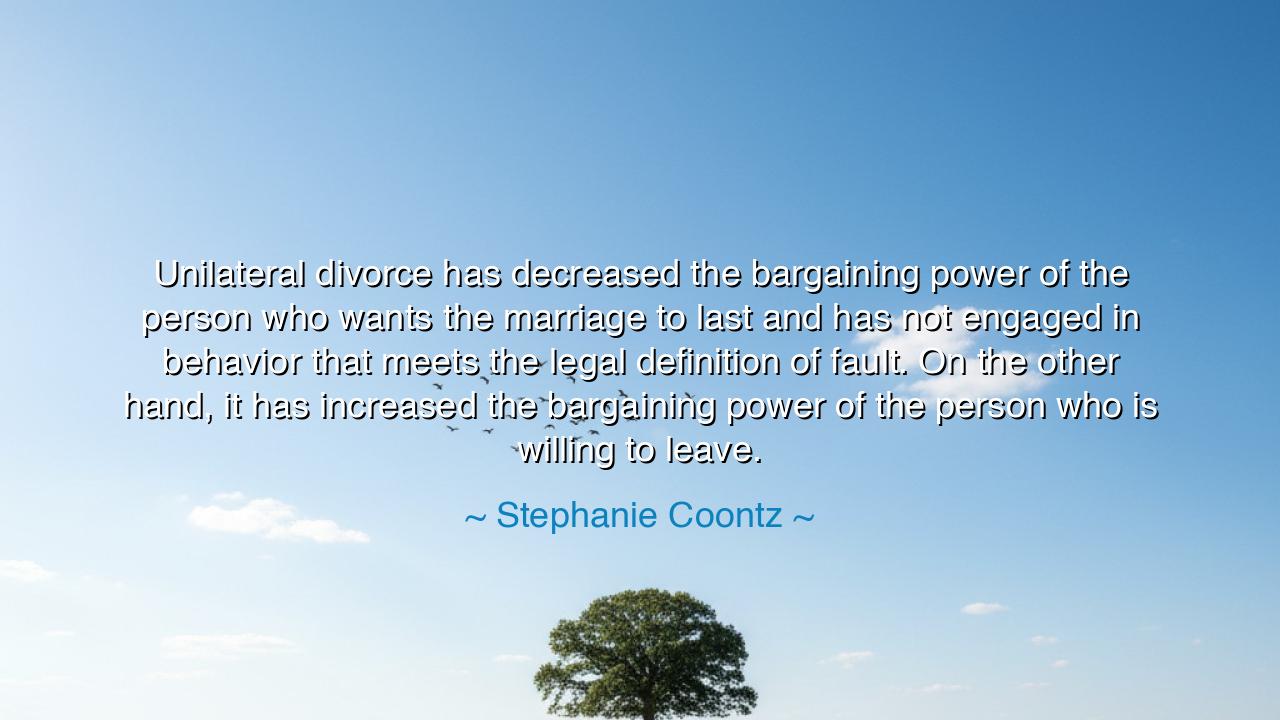
Unilateral divorce has decreased the bargaining power of the
Unilateral divorce has decreased the bargaining power of the person who wants the marriage to last and has not engaged in behavior that meets the legal definition of fault. On the other hand, it has increased the bargaining power of the person who is willing to leave.






The wise Stephanie Coontz speaks of a truth both ancient and modern, when she declares: “Unilateral divorce has decreased the bargaining power of the person who wants the marriage to last… and has increased the bargaining power of the person who is willing to leave.” Her words are not merely legal in their scope, but prophetic in their depth, for they remind us that the laws of men can reshape the balance of power within the most sacred of bonds. Once, when the covenant of marriage was broken only through mutual consent or clear fault, the one who desired fidelity had a voice equal to the one who sought departure. But now, with the ease of single-handed dissolution, the scales tip toward the one ready to abandon, and the steadfast heart is left pleading with empty hands.
This truth is born from history. In earlier centuries, marriage was bound by chains of duty, whether forged by law, custom, or faith. A husband or wife could not so easily forsake their vows without proving adultery, cruelty, or desertion. In this system, the loyal partner wielded some protection, for society and law required the deserter to answer for their sins. Yet in the new age of unilateral divorce, the gate is flung open. No accusation need be proved, no wrong established. The one who grows restless may walk away, while the one who remains faithful must endure loss, without recourse to shield themselves. Thus is born the imbalance Coontz describes—a shift in bargaining power toward the fleeting heart.
We may recall the story of Emperor Henry VIII of England, who, in the sixteenth century, sought to dissolve his sacred union with Catherine of Aragon. In that age, when divorce was near impossible, his relentless desire for freedom and another wife shook kingdoms, split churches, and overturned the order of Christendom. Catherine, though innocent of any fault, clung to her vows. Yet even she, protected by the strictest laws of matrimony, could not prevent his departure when his will grew unyielding. History teaches us: when one heart is bent on leaving, even the mightiest rules may falter. What, then, of our own era, where the rules themselves now serve the leaver more than the faithful?
Still, we must not fall into despair. For even as the laws of men shift, the laws of honor, love, and self-respect remain eternal. The faithful must learn that their worth is not diminished when the balance of worldly power turns against them. The one who desires to keep a union alive must stand strong not in fear or bargaining, but in the knowledge that their steadfastness is a jewel no law can tarnish. The one who leaves may wield the weapon of law, but the one who stays wields the weapon of integrity.
The teaching of Coontz calls us, then, to a double wisdom: first, to see clearly how structures of power can change the dance of human bonds; second, to fortify our souls so that we are not crushed when such power is used against us. For every age brings forth its trials—whether chains too heavy or freedoms too wide. The true strength lies not in law, but in the character with which we endure its consequences.
The lesson for us, children of this fleeting age, is this: do not bind your happiness solely to the will of another, nor make your peace rest entirely upon the fragility of human promises. If you love, love fiercely and fully. But also guard the temple of your own spirit, so that if the other turns away, you remain whole, and not broken. For though the bargaining power may belong to the one who leaves, the power of dignity belongs to the one who knows their worth.
Practical wisdom flows from this: cherish your partnerships, but do not neglect your independence. Strengthen your voice, your skills, your friendships, and your faith, so that no departure can strip you of all. When conflict arises in marriage or in life, speak openly, seek justice, but never abandon the core of your being to the shifting laws of men. Walk in honor, whether you are left behind or whether you choose to stay. In this way, you will carry within you a fortress no decree of divorce can ever breach.
Thus, remember: laws may shape the outer world, but it is the inner law of the soul that determines whether we stand as beggars of affection, or as kings and queens of unyielding spirit. Let Coontz’s words not be lament only, but a summons—to see the truth, to learn its lesson, and to rise stronger, whether we are the one who stays, or the one who must walk alone.






AAdministratorAdministrator
Welcome, honored guests. Please leave a comment, we will respond soon